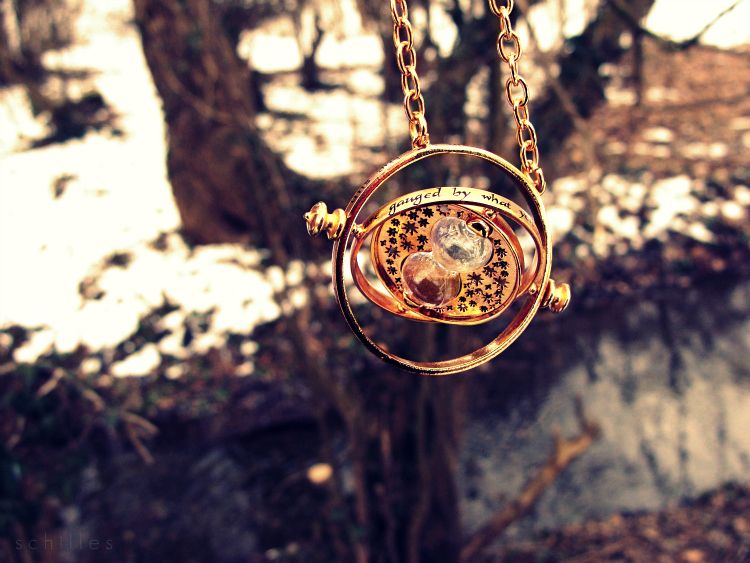Time-Turners - Your World or Another?
(WARNING-Contains spoilers!)
By now all of us are familiar with time travel. In the world of Harry Potter, you simply need a magical device called a “Time-Turner”. From ordinary eyes, the Time-Turner appears as a necklace attached to an hourglass. When examined closely, you might be able to make out the words "I mark the hours, everyone, nor have I yet outrun the Sun. My use and value, unto you, are gauged by what you have to do." The rules are simple. The time-traveler has to wear the Time-Turner and turn it over (one turn for every hour) until he arrives at his preferred time. If you wish to take a companion alongside you, you have to put the Time-Turner on him too.
Before we talk about the confusing effects of time travel, let’s see what JK Rowling has to say about it.
I went far too light-heartedly into the subject of time travel in Harry Potter and the Prisoner of Azkaban. While I do not regret it (Prisoner of Azkaban is one of my favorite books in the series), it opened up a vast number of problems for me, because after all, if wizards could go back and undo problems, where were my future plots? I solved the problem to my own satisfaction in stages. Firstly, I had Dumbledore and Hermione emphasize how dangerous it would be to be seen in the past, to remind the reader that there might be unforeseen and dangerous consequences as well as solutions in time travel. Secondly, I had Hermione give back the only Time-Turner ever to enter Hogwarts. Thirdly, I smashed all remaining Time-Turners during the battle in the Department of Mysteries, removing the possibility of reliving even short periods in the future. This is just one example of the ways in which, when writing fantasy novels, one must be careful what one invents. For every benefit, there is usually a drawback.
In the Prisoner of Azkaban, at the end of their third year in Hogwarts, the golden trio has a really bad evening. They fail to save Buckbeak from execution, a werewolf is unleashed on a full moon, Sirius is left to die for crimes he didn't commit, and worst of all, Peter Pettigrew (servant of Lord Voldemort) escapes! This is where the Time-Turner comes into play. Ron is too severely injured to go on a trip through time, so Harry and Hermione share the Time-Turner and try to undo the mess they have made. They start with the first mistake they made and rescue Buckbeak the hippogriff. Then things get too complicated. Try as he might, Harry realized he can't find a way to stop a werewolf, bring Pettigrew to justice and also save Sirius. Even if you have a Time-Turner, some things are out of your control. Harry rethinks his priorities and decides to save his godfather. We see that Hermione and Harry made some adjustments, but they do end up right where they began…they return to their own timeline.

Then let's talk about a different interpretation of Time-Turners. Quite a lot of us have either read or watched the sequel, “The Cursed Child”. Some fans don't like it because the style is a bit different, and they don't consider it canon. All the same, I found it to be quite a compelling story. Harry Potter is an adult now, a father, and Auror - he's seen his fair share of things. He's accepted the fact that some things are beyond his control and has learned to live with them. It is his son Albus Potter who tries to use a Time-Turner because he simply can't deal with the past. When Albus thought he had a chance to prevent Cedric Diggory's death, he used a Time-Turner to try and make things right. This is where things get tricky. In the timeline Albus is currently in, Voldemort murders Cedric. When Albus uses the Time-Turner, the timeline splits and Albus ends up in a new world. In a separate timeline. One where Ron and Hermione never end up together, and Albus's best friend, Rose Weasley, simply doesn't exist. And as we see, it doesn't stop there. Convinced he can still try and fix this, Albus goes further back in time. He creates another timeline where the battle of Hogwarts was won by the Death Eaters. Albus barely manages to escape with his life.
We can see Time-Turners from two different perspectives. In the main series, they are a very useful device, capable of bending the rules, but not breaking them. It is sort of a loop. You make minor changes, but you then return to your own timeline. For instance, in the Prisoner of Azkaban, the Time-Turner was mostly used to allow Hermione to take extra subjects and cope with her homework.
However, in the sequel, Time-Turners break the rules of space-time continuity completely. In effect, Albus isn't going back in time when he uses a Time-Turner, he creates a separate universe (very similar to his own) and changes the sequence of events in his new world. The catch is, Albus can never really return home because even if he fixes his own meddling, he's doing that in a duplicate timeline.
Since all fantasies are grounded in reality, what do you think?
Do you believe what will be will be? Or do you believe that the tiniest actions have far-reaching consequences?



